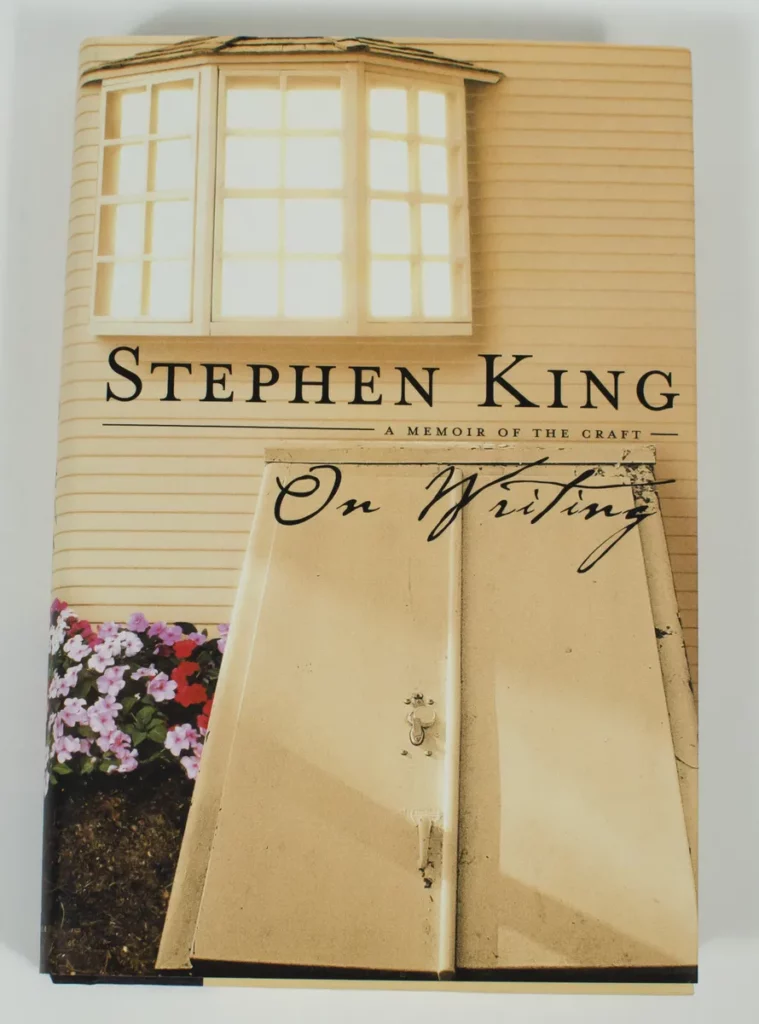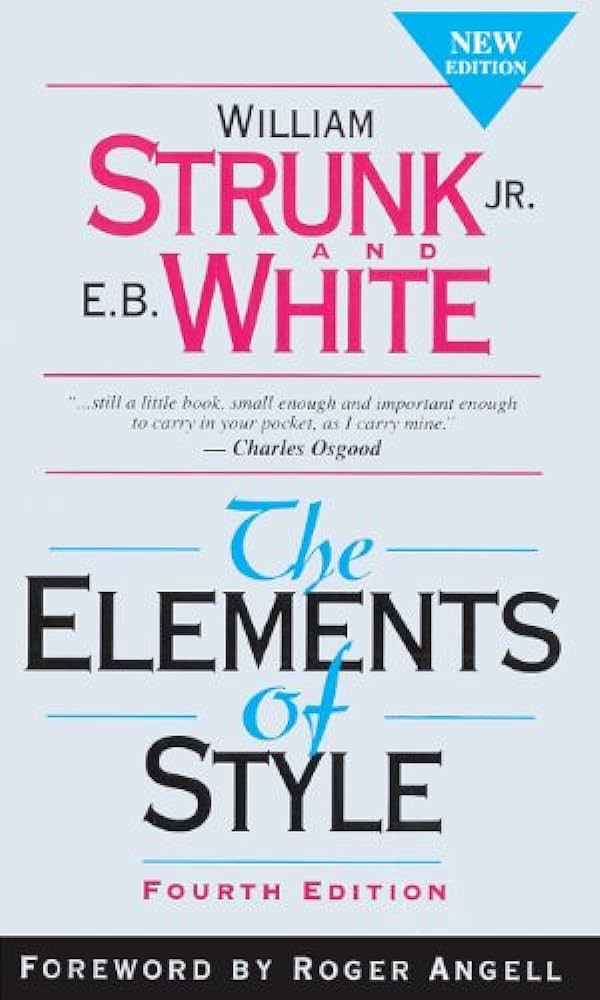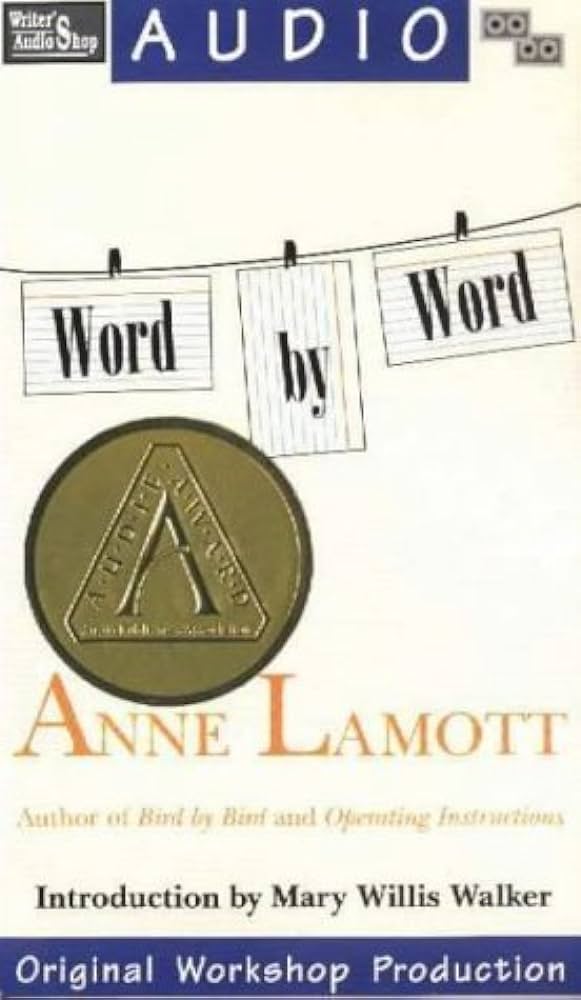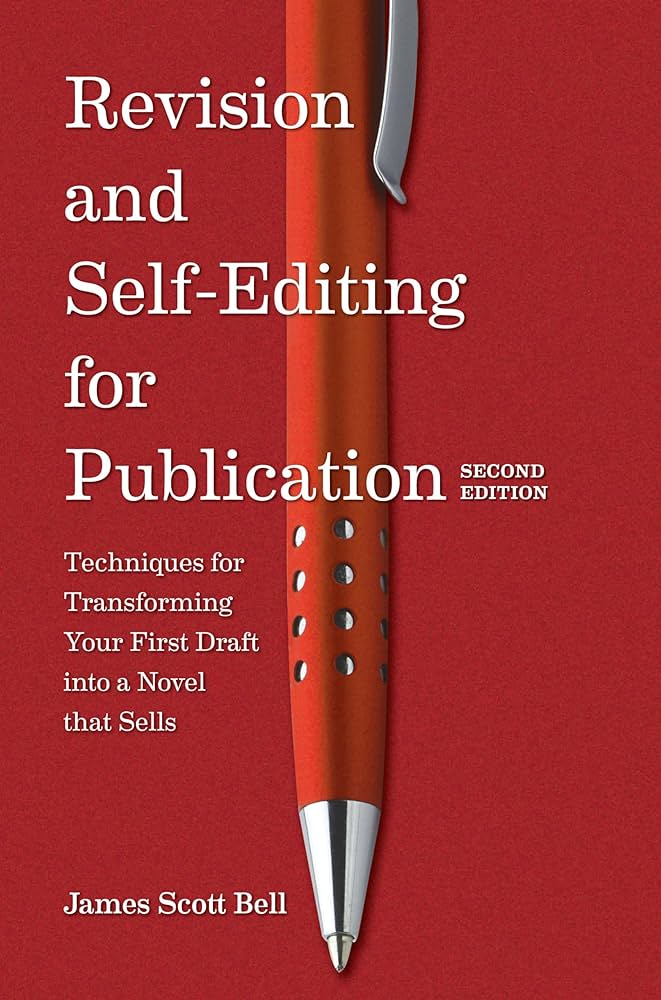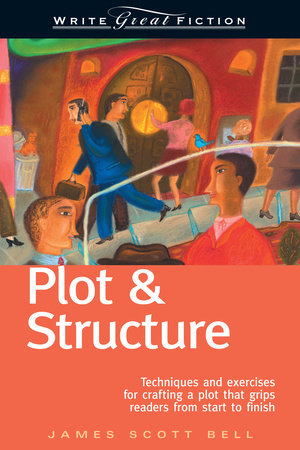
Here are some things that I have learned through the years about writing and would like to pass on to you, in no particular order, just as they come to me…
Write First, Edit Later
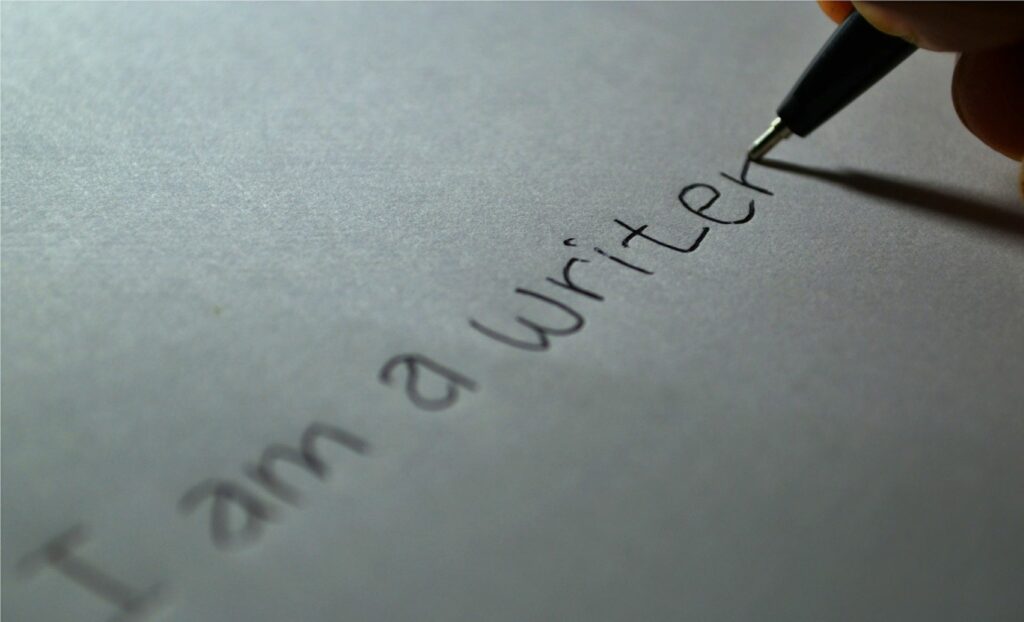
There are different styles for different writers and you must find your own way of putting the 26 letters on the page. One way is not necessarily better than another however some of you may get bogged down on the editing part and it yanks the joy of the creative process out of your hands.
Get the words down on the paper and don’t worry about the editing process in your first draft. This is good advice for both fiction and non-fiction writers. Get the words on the page. Many times when I write, if I take too long stopping and starting on a work then I lose the intention that I want to get on the page; so get the thoughts out and edit later. You can go in later and put in or take out or correct what you don’t like, clean it up, embellish or delete. It’s okay. You may want to say: “But what about…” It’s okay, get the story or thoughts down and procrastinate on the clean-up.
If you need permission. Consider it granted!
Have fun!

“A CRAPPY FIRST DRAFT IS WORTH MORE THAN NO DRAFT AT ALL.”
Dialogue
Dialogue is the quickest way to move your story along without getting boring with a lot of description or backstory. Explanation in the mouths of characters is much more realistic than a couple of paragraphs of description. This hearkens to a time when all history was passed down from generation to generation by word of mouth out of the story-tellers, patriarchs and wise-men. Being able to write good dialogue is a key to letting an editor or agent realize you know what you are doing. Stilted dialogue comes, many times, from not listening to the way people interact and communicate with one another.
Here’s a nice exercise that you can try to help you improve your dialogue. This does presuppose that you can type or write rather fast but try it anyway and you’ll get the gist and have fun also.
Take your laptop or notebook into a restaurant, mall or public place and listen to the way that people speak to each other, their cadence, dialect, accents, inflection, reaction, tonality and rhythm. Jot down a few notes on the way they speak or make up some conversations that are similar (and don’t worry about getting the punctuation correct, remember, edit later). When you listen to conversations, you will understand how people speak to one another.

“HERE’S THE THING: THE BOOK THAT WILL MOST CHANGE YOUR LIFE IS THE BOOK YOU WRITE” – Seth Godin
Don’t Be Afraid
So many people I meet say: “I think I have a book in me.” But they never end up writing and I believe this is largely because of fear. And it is usually fear of failure. I find that the Nike slogan applies here: JUST DO IT!
If you want to write, sit down and write, we call it BIC – Butt In Chair. Get your thoughts out, get them down on paper or computer, let them flow and remember: Write First Edit Later. You will find the satisfaction comes by just getting your thoughts out. This is true for both Fiction and Non-Fiction. And don’t be afraid that someone else has already done what you want to do. THEY HAVE! You may feel, well (Name your favorite author here) has already told a story like this, or written a book on this subject. But if that was the case, there would only be about ten authors in the world. YOU have a unique way of looking at life and story; so get it down.
We all tend to tell different versions of the same story. Stephen King says he quite often tells a different take on a story that he viewed as a kid and teen when he was watching the old horror films at the movies.
We all recycle the same plot patterns in fiction:
1. Overcoming the monster. 2. Rags to riches. 3. The Quest. 4. Voyage and return. 5. Comedy. 6. Tragedy. 7. Rebirth.
Story is key, write it down and don’t be afraid. Let me encourage you. Write it!
And don’t kick yourself when it isn’t quite ready with the first draft, it never is, you will rewrite. How much and how many, depends on the author. Kurt Vonnegut rewrote the same page over and over until he got it right. Stephen King says he does two drafts and a polish, but he has been writing for over sixty years. You will find your groove and your production of words and you don’t have to be afraid of that. Write it until it feels like you have said it the way you want to say it and in fiction, write until the story makes sense.
“IF YOU WANT TO CHANGE THE WORLD, PICK UP YOUR PEN AND WRITER” – Martin Luther
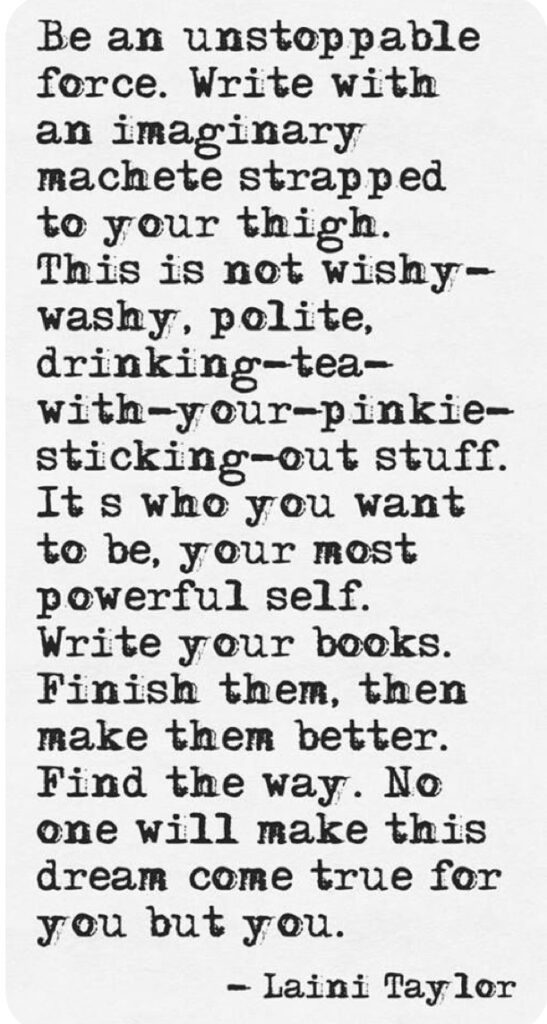
Finishing a Book
There is quite a feeling of satisfaction when you finish a book.
When you type that last word and the held breath escapes your lungs and you look back on 436 pages of a novel, it is a heady experience. There is a sense of completeness and euphoria.
You have put in the time and aligned the characters withing the quest and finally your protagonist sweeps the fair maiden into his embrace as they gallop off onto the western facing plane. We don’t usually write THE END any more, but it is the end. The finale. That’s all she wrote. Such a feeling of satisfaction. So, keep going and FINISH that book! You can do it!
WRITE YOUR FIRST DRAFT WITH THE DOOR CLOSED-LATER YOU WILL OPEN THE DOOR AND LET THE WORLD IN.
Be brave enough to write something that sucks! At first…
The Almighty Edit
No matter how many times you read through, read through again. (This may not totally be true) But I am amazed at things I miss, even the tenth time through a manuscript. Best to let others read and of course, an editor, if you can afford. (Editors cost!)
But remember, don’t beat yourself up when you find obvious flaws and foibles. It happens, even to seasoned, New York Times best sellers.
And here is something, I was reading a book, by a NY Times best seller, that had already been published and sold a gazillion copies and I found a typo! Ha. It happens. So, give someone or some people, perhaps a group access to your work, when YOU are ready and let them read it and tell you what they think. And even your mom, but she will always tell you it’s wonderful.
I have a group of about 15 people that always read my books before publication. I have named them the: Bibliophile Mélange. And they have saved me some embarrassment through the years. I print galley copies of my work for those who want a tactile experience and some like electronic versions for their tablets and I give them to the group. I then have a questionnaire to fill out, including things like the following when I wrote CAIN:
- Continuity
- Was there continuity to the story?
- Did the story flow?
- Was the story easy to follow?
- Was any part confusing?
- Did story lines tie up by the last page?
- At what point did you put CAIN down and stop reading?
- Any point that your interest faded?
- Did you skip or simply skim through any parts?
- Was there any point in the story that I lost you?
- Beginning
- Was the opening, “In medias res”? Latin for “into the middle of things.” Did it grab you? Interest you? Make you want to read more? If you picked it off of a shelf because of the cover and flipped to the first page, would you want to buy the book?
- After the first scene, what expectations came to mind?
- Middle
- Were any parts boring or repetitious and you found yourself not caring?
- End
- Was the Climax expected? Unexpected? Inevitable? Discovered early?
- Setting
- What setting or description did you most identify with or like? Or hate?
- Dialogue
- What was there about the dialogue that drew you in or alienated you? Which character did you like in regard to the dialogue? Did you find any dialogue hard to read, understand or digest?
- Is there an appropriate amount of description, dialogue, action etc.? Not necessarily balance because my novels tend to lean toward dialogue, but appropriateness?
- Any problems with the dialogue?
- Characters
- Did you understand who was who?
- Any characters that you felt unnecessary to the story?
- Any characters that you felt that you were supposed to like but didn’t?
- Any characters that you felt that you were supposed to hate but didn’t?
- Did they seem real? Their background, history, personalities, stereotypes?
- Who was your favorite? Why?
- What characters did you feel most strongly about, either good or bad?
- Was there conflict?
- Physical?
- Mental?
- Emotional?
- Too much? Not enough? Who and why?
- Did you feel the proper POV (Point of View) in each chapter? In other words were you seeing through the eyes of the characters?
- Generalities
- What was your favorite part? Why?
- Any problems with the narrative?
- Did you spot any general tics or flaws?
- Did you catch any sort of theme or through line?
- Did you enjoy the ride?
Now, keep in mind, these are family, friends, co-workers, experts in different fields. They have a myriad of occupations. I have a computer code writer, school teacher, accountant, tech people, industry manufacturer, a few college students, retirees, one from IBM, one from a military back ground, market researcher, a telecommunications supervisor, an editor and several others. Because I write suspense, police procedurals at times, I have the privilege of having some law enforcement personnel on the payroll (Kidding, I don’t pay anyone, they all perform their duties, gratis) and they are all honest with me. They will tell me when something works and when it doesn’t or if I have forgotten to sew up some loose ends on a character or if a make and model of a firearm might not be correct or if something doesn’t make sense and even if some part got boring or it caused them to lose interest. And sometimes if things were TOO gory for the general public. (An issue that I have frequently) All invaluable to me.
We all have a blast. I know I do.
After all have read the entire work, yes sometimes all 600 or more pages, I ask them not to discuss with anyone, fill out the questionnaire and then I invite them over to the house. We make them dinner and they tell me what they think. Some that have moved out of state, still participate with zoom calls. (They eat their own burritos at home though.) I have done this for more than fifteen years now, and it is amazing to me the help that it is. I may not always agree with all assessments, but if several of them catch something along the same line, I know that I didn’t write it well or explain it well, so I will go and change it. But there are some things I leave as is, even if we disagree.
But it has worked out well and I am so grateful for the insight.
I also have sessions called: Ask the Author. This is a wider group of readers that read the book, after editing and publication and I get feedback from them also.
You may or may not try such a feat; but only if you are unafraid; and with friends and family, hopefully you can be yourself and take the editorial review. Not everyone can or does and that is okay also, find what works and helps you.
“YOU MIGHT NOT WRITE WELL EVERY DAY, BUT YOU CAN ALWAYS EDIT A BAD PAGE. YOU CAN’T EDIT A BLANK PAGE.” -Jodi Picoult
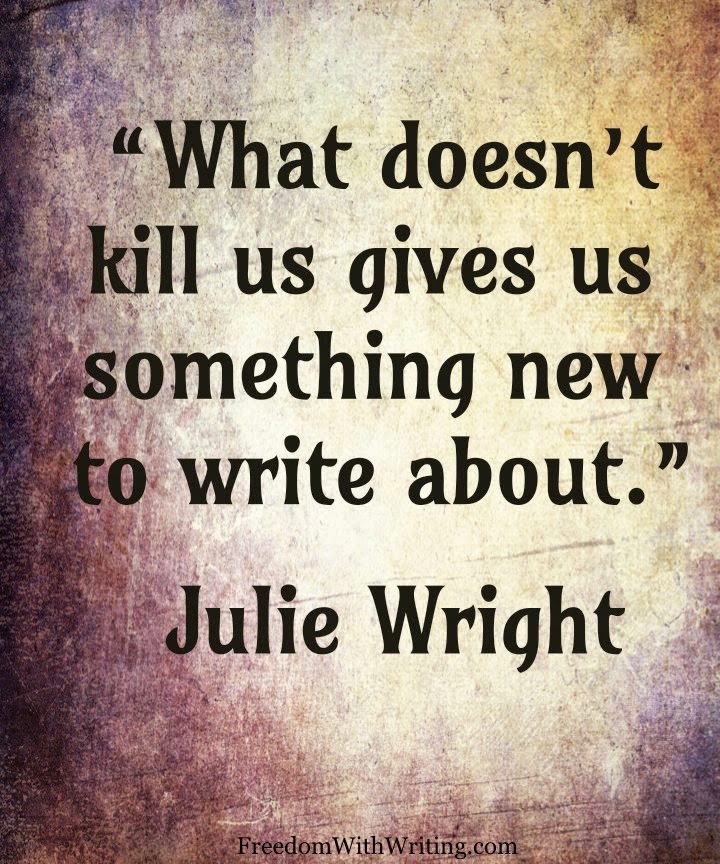
MANY AUTHORS TYPE SIMPLY USING TWO FINGERS. IF YOU ARE IN THE THROES OF COMPOSITION, SOMETIMES YOU’RE JUST FLIPPING THE WORLD OFF!
“I don’t write the first scene, until I know the last scene.” – John Grisham
Someday, you are going to be someone’s favorite author!
“It’s too late to be studying Hebrew; it’s more important to understand… the slang of today.”
Henry David Thoreau
Some Recommended books on writing:
